When vendor management goes well, you hardly notice it. When all your vendor relationships are harmonious, well-aligned, and productive, business can carry on as usual.
On the other hand, when it goes wrong, you can be throwing money down the toilet. According to one estimate from Gartner, 62% of digital spending goes on products and services from third-party vendors. So for any company, bad management means spending a lot of money on bad systems. Poor vendor management means inefficiencies everywhere.
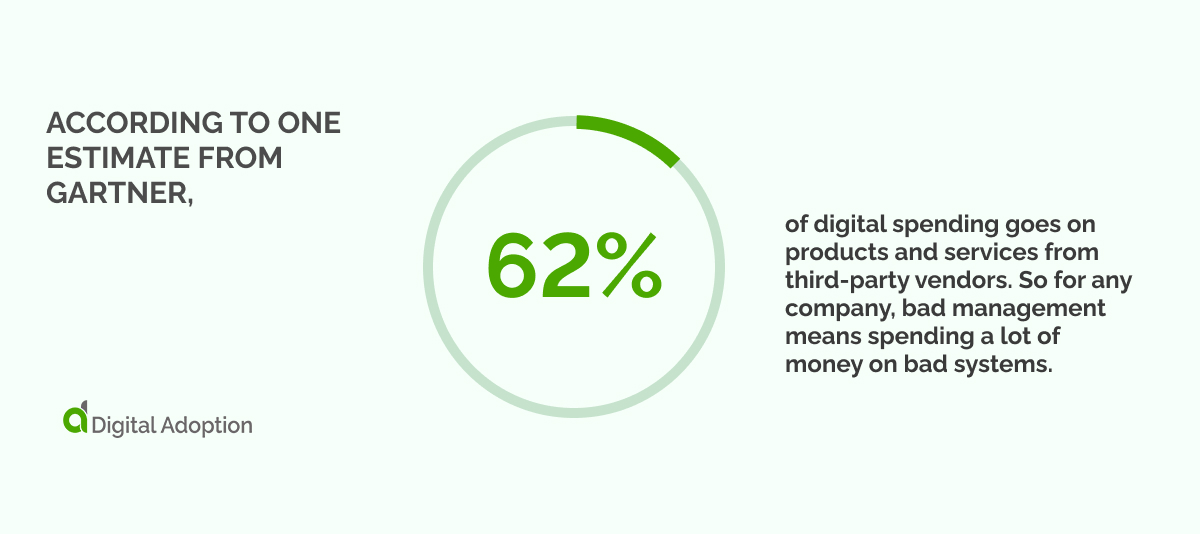
In this article, we will keep our eye on the prize by looking at the benefits of good vendor management. We’re going to assume that you already know what vendor management is – and start by quickly outlining some of the features of good management.
Then, we’ll talk about the top nine benefits of vendor management (sometimes called supplier management) in your company.
Finally, we’ll dish out a bit of advice about how you can achieve stronger vendor relationships. Our key recommendation is to use appropriate software like a vendor management system, build a decent talent pool, plan strategically, and implement suitable software.
After all, this wouldn’t be a Digital Adoption blog post without mentioning the massive benefits of digital adoption in business!
So let’s see what you can get from a better vendor management program.
Features of great vendor management
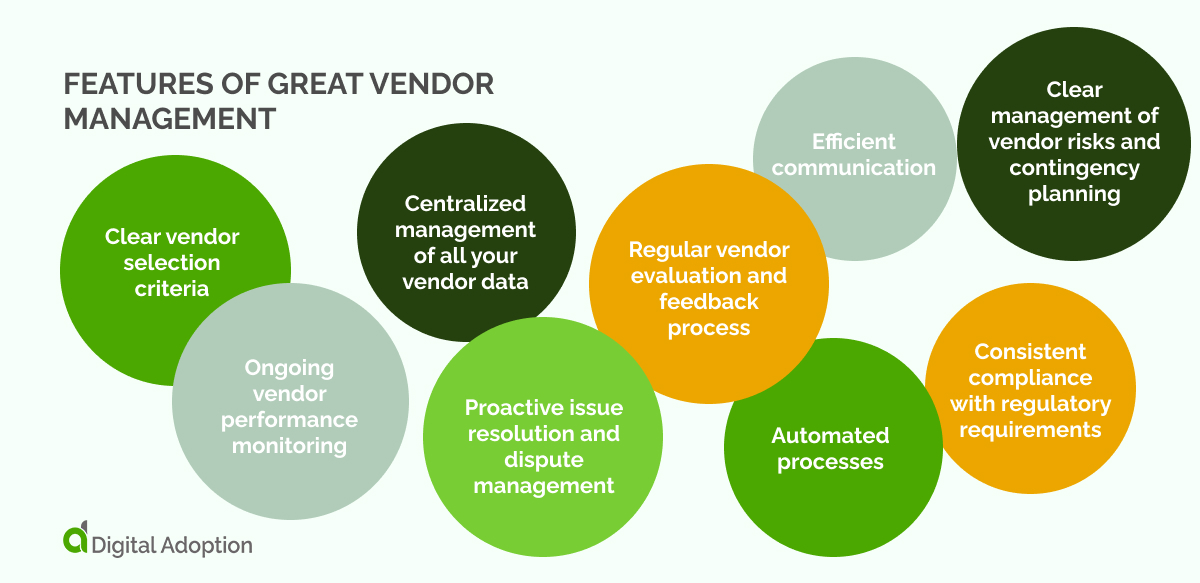
In this article, we’re going to focus on the benefits. But remember, these benefits can only come when your features are in order. We won’t go into the practices: though you can read more about this in our guide to the art of vendor management.
To keep it simple, an effective vendor management process means you might have some of the following features:
- Clear vendor selection criteria
- Ongoing vendor performance monitoring
- Centralized management of all your vendor data
- Proactive issue resolution and dispute management
- Efficient communication
- Regular vendor evaluation and feedback process
- Clear management of vendor risks and contingency planning
- Consistent compliance with regulatory requirements
- Automated processes
Most of the time, you might not notice these activities happening.
You’ll see the results of the positive features in the general benefits. And when something goes wrong, the positive features will become much more important.
The top nine vendor management benefits
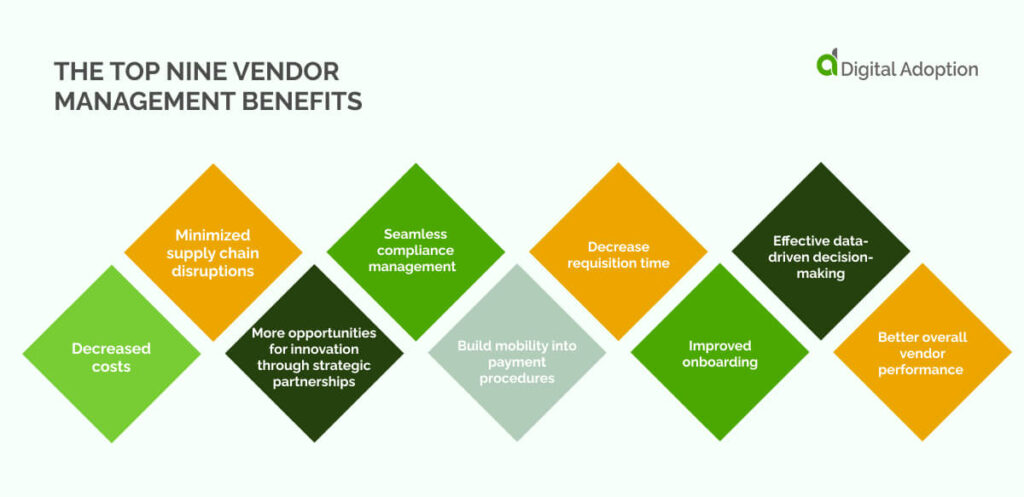
For a few minutes, forget the challenges of vendor management! If you’re here, you’ll obviously want to optimize the performance of third-party agents, reduce vendor payment risk, and build strong vendor relationships.
So let’s look at all the benefits you can achieve from the best vendor management practices. We’ll start with the obvious stuff – reducing costs and supply chain disruptions – before talking about compliance, mobility, decision-making, and more.
1. Decreased costs
Effective vendor management can help you reduce costs by leveraging competitive pricing through vendor selection and negotiation. Regular monitoring allows for the identification of cost-saving opportunities and process optimization.
Collaborating with vendors fosters open communication and facilitates negotiations for cost-saving initiatives. Actively managing vendor relationships and continuously assessing costs contribute to decreased costs and improved financial performance.
2. Minimized supply chain disruptions
Vendor management plays a vital role in minimizing supply chain disruptions.
There are various ways to achieve this – diversifying vendor sources or maintaining clear communication channels. Good relationship managers are proactive in resolving issues: giving a timely response to potential disruptions ensures smooth operations and business continuity.
Robust risk management strategies and contingency plans mitigate the impact of unforeseen events.
3. More opportunities for innovation through strategic partnerships
Effective vendor management opens up opportunities for innovation through strategic partnerships. Organizations gain access to specialized knowledge and resources by selecting vendors based on their expertise.
Collaborative relationships with vendors foster innovation through shared insights and joint problem-solving. Regular communication and feedback sessions enable organizations to capitalize on vendor expertise and develop innovative solutions. Building strategic partnerships with vendors encourages a culture of innovation and enhances competitive advantage.
4. Seamless compliance management
Vendor management facilitates seamless compliance management by ensuring vendors meet regulatory requirements. Thorough vendor assessments and due diligence verify vendor compliance before engagement.
Clear contractual agreements establish compliance expectations and adherence to legal and industry standards. Proactive communication and vendor collaboration foster a shared commitment to compliance, resulting in seamless compliance management.
5. Build mobility into payment procedures
Incorporating mobility into payment procedures enables convenient and efficient vendor management. Implementing mobile payment solutions simplifies and expedites payment processes. Mobile apps or digital platforms facilitate secure and fast payment transactions, reducing administrative burdens and enhancing vendor satisfaction.
By embracing mobile payment solutions, organizations streamline payment procedures and improve overall efficiency in vendor management.
6. Decrease requisition time
Efficient vendor management allows organizations to decrease requisition time, enhancing operational efficiency. Establishing streamlined requisition processes and utilizing technology platforms automate and expedite requisition workflows. Standardized templates and pre-approved vendor lists reduce processing time and eliminate bottlenecks.
By optimizing requisition procedures, organizations can accelerate procurement processes. This improves overall efficiency and reduces cycle times.
7. Improved onboarding
After the initial procurement process has finished, the onboarding process is much easier for all parties. Clear communication of expectations, deliverables, and timelines establishes a strong foundation for collaboration. Providing training and resources to vendors facilitates their understanding of the organization’s operations and requirements.
By prioritizing a smooth onboarding experience, organizations can establish productive relationships with vendors from the outset.
8. Effective data-driven decision-making
Vendor management enables effective data-driven decision-making through comprehensive data analysis and reporting. Capturing and analyzing vendor performance data provides valuable insights for strategic decision-making. Utilizing vendor management software and analytics tools enhances data collection and analysis capabilities.
By leveraging data-driven insights, organizations can make informed decisions to optimize vendor relationships, identify cost-saving opportunities, and enhance overall operational performance.
9. Better overall vendor performance
Good vendor management improves overall vendor performance through continuous monitoring and collaboration. Clearly defined performance metrics and regular evaluation processes ensure accountability and improve performance.
Open communication channels and regular feedback sessions facilitate alignment and prompt issue resolution. Organizations can enhance vendor performance by actively managing vendor relationships and fostering a collaborative environment, resulting in improved product/service quality, increased efficiency, and strengthened partnerships.
How to get the full benefits of vendor management
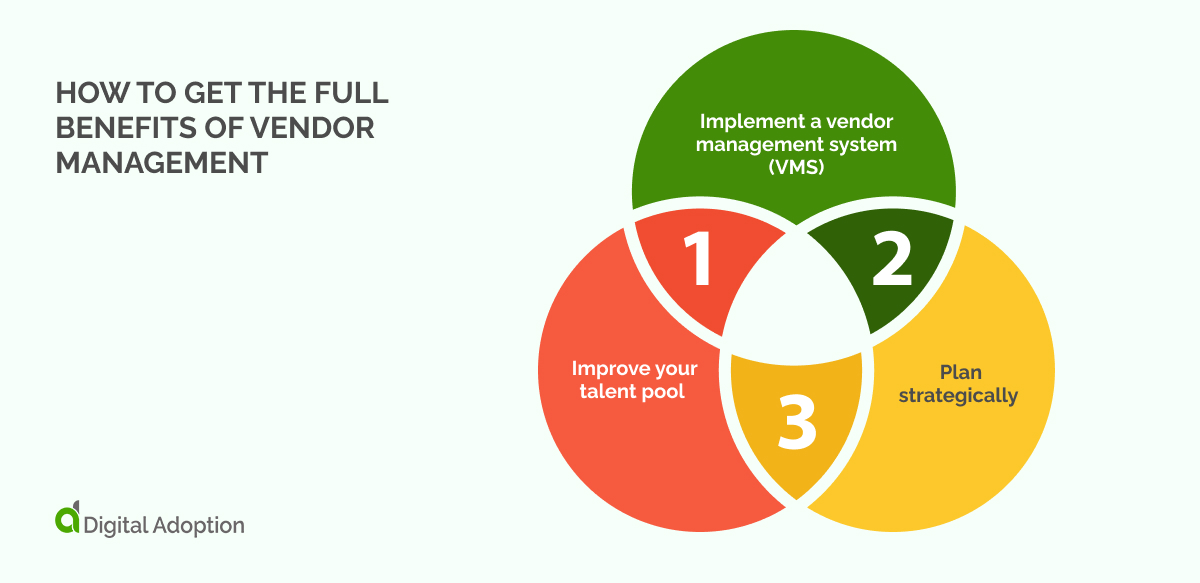
Now that we’ve talked about some of the main benefits of vendor management, we must take a moment to explain how to get those benefits. This is not the place for a full explanation. After all, this is a complex field!
But to get started, you can improve your talent pool, implement a vendor management system, and plan strategically.
Improve your talent pool
The right talent plays a crucial role in supporting improved vendor management processes. Skilled professionals with expertise in vendor management bring in-depth knowledge of sourcing, negotiation, contract management, and relationship-building. They can effectively identify and select vendors that align with business needs, negotiate favorable contracts, and manage vendor relationships proactively. These individuals possess strong communication and analytical skills, enabling them to assess vendor performance, identify areas for improvement, and implement strategies to optimize vendor relationships.
Implement a vendor management system (VMS)
Like many problems in today’s advanced digital economy, software solutions can make a big difference to your vendor management process. Vendor management software (often known as vendor management systems) does much of the heavy lifting for you. With the right digital solution, evaluating vendor performance becomes a lot easier. These days, there’s even open-source vendor management software that you can adapt to your specific needs
Plan strategically
Improved strategic planning supports better vendor management processes by aligning vendor selection with organizational goals, mitigating risks through contingency planning, setting key performance indicators, fostering collaboration, and optimizing costs. It provides a framework for choosing vendors to contribute to long-term success, monitoring performance, and cultivating strong relationships.
At the simplest level, anticipating your needs can make a big difference. As a recent Gartner blog explains, standard documentation shows you what needs to be done.
Vendor management: a world of benefits
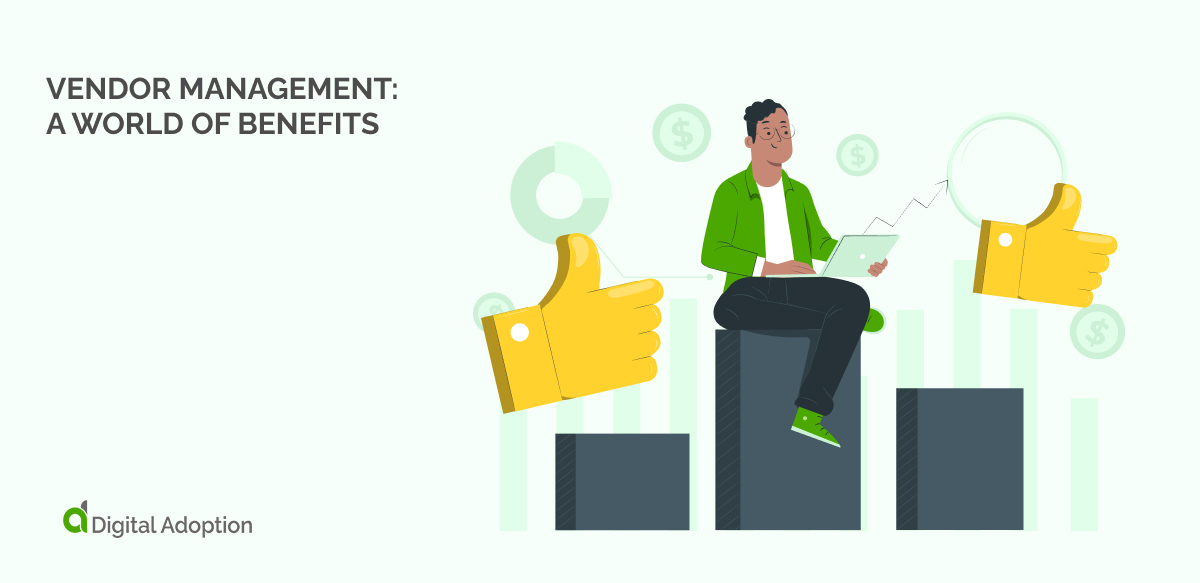
Keeping on top of the vendor management process is not easy. Today vendor management has been going through a decade of change. Vendor management systems have become standard across industries. And in this new era of cloud software services, vendor relationships have changed dramatically. McKinsey’s analysis explained the market shows no signs of slowing.
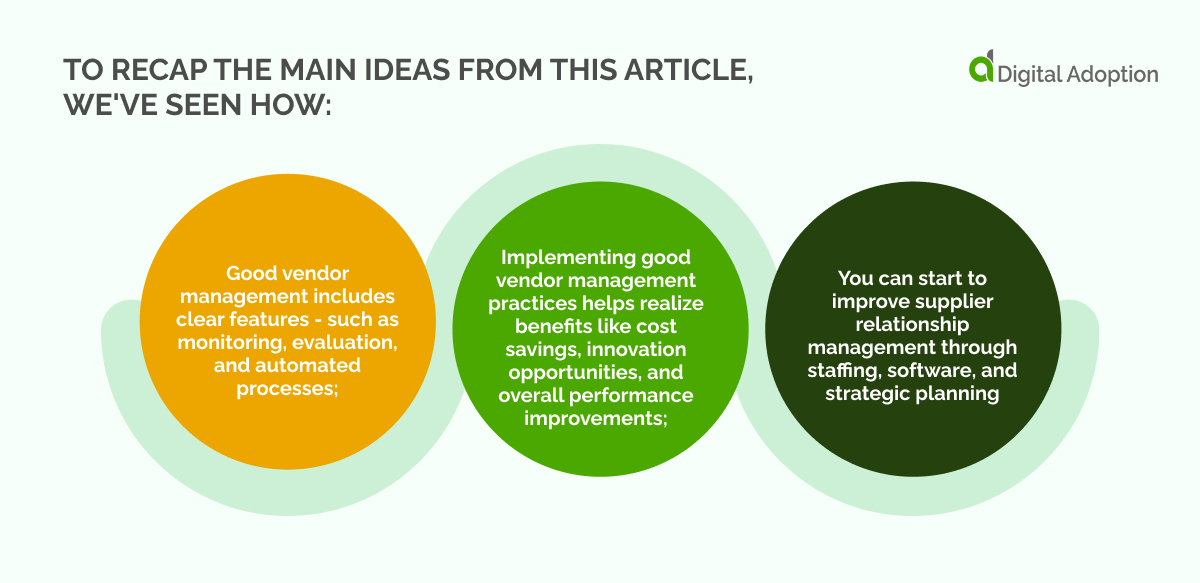
So, there’s no better time to remind ourselves of best practices in vendor management. To recap the main ideas from this article, we’ve seen how:
- Good vendor management includes clear features – such as monitoring, evaluation, and automated processes;
- Implementing good vendor management practices helps realize benefits like cost savings, innovation opportunities, and overall performance improvements;
- You can start to improve supplier relationship management through staffing, software, and strategic planning
Vendor management is a complex discipline, and we haven’t discussed many specific issues here. But put simply, if you want to manage labor costs, track performance, and mitigate risk, improved vendor management is the way ahead.

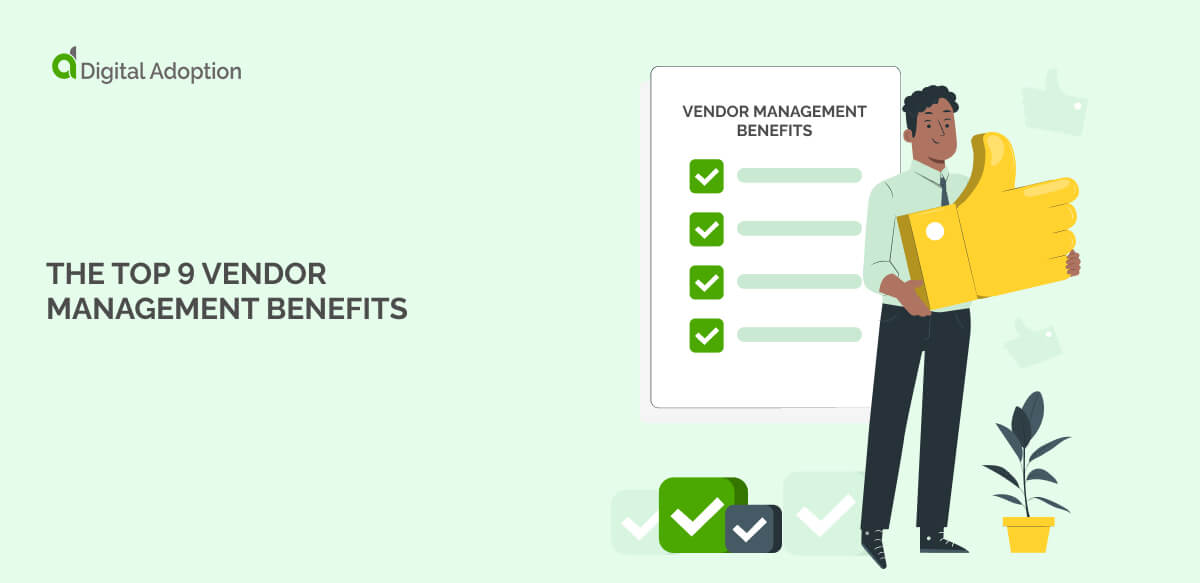


![18 Examples of AI in Finance [2025]](https://www.digital-adoption.com/wp-content/uploads/2025/06/18-Examples-of-AI-in-Finance-2025-300x146.jpg)
![14 Examples of AI in Manufacturing [2025]](https://www.digital-adoption.com/wp-content/uploads/2025/06/14-Examples-of-AI-in-Manufacturing-2025-300x146.jpg)
![29 Examples of AI in Education [2025]](https://www.digital-adoption.com/wp-content/uploads/2025/06/29-Examples-of-AI-in-Education-2025-300x146.jpg)
![15 Examples of AI in Retail [2025]](https://www.digital-adoption.com/wp-content/uploads/2025/06/15-Examples-of-AI-in-Retail-2025-300x146.jpg)
![13 Examples of AI in Healthcare [2025]](https://www.digital-adoption.com/wp-content/uploads/2025/06/AI-in-healthcare-examples-300x146.jpg)


![18 Examples of AI in Finance [2025]](https://www.digital-adoption.com/wp-content/uploads/2025/06/18-Examples-of-AI-in-Finance-2025.jpg)
![14 Examples of AI in Manufacturing [2025]](https://www.digital-adoption.com/wp-content/uploads/2025/06/14-Examples-of-AI-in-Manufacturing-2025.jpg)
![29 Examples of AI in Education [2025]](https://www.digital-adoption.com/wp-content/uploads/2025/06/29-Examples-of-AI-in-Education-2025.jpg)